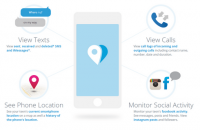-
Twitter goes down and believers in conspiracy theories pounce

Twitter service in Japan and parts of the United States was down earlier today (Monday), shortly after WikiLeaks claimed that its servers had been subjected to a cyberattack. When service was restored, some users were quick to see a conspiracy, linking the outages at WikiLeaks and Twitter to the WikiLeaks release of a new set of hacked e-mails from the Democrat National Committee. “.@Twitter was down ~ 25 min. #DDOS or US Govt? #DNCLeak2 intel docs reference killings of Vince Foster & Ron Brown,” said one tweet.
-
-
The “blind spot” in extremist Web content
In order better to understand the process of on-line radicalization, researchers examined the average monthly number of global searches and regional search frequencies conducted in Google for 287 Arabic and English keywords relating to violent and non-violent extremism. Further analysis was then conducted within the search results for forty-seven of the relevant keywords to understand placement of extremist and counter-narrative content.
-
-
Widespread anti-Semitic harassment of journalists perceived as critical of Donald Trump: Report
A new report released earlier today by the Anti-Defamation League (ADL) details a troubling, year-long rise in anti-Semitic hate targeting journalists on Twitter, with data showing that the harassment has been driven by rhetoric in the 2016 presidential campaign. The anti-Semitic tweets have been directed at 800 journalists, both conservative and liberal, who wrote critically about Trump. The tweet writers are disproportionately likely to self-identify as Donald Trump supporters, conservatives, or part of the “alt-right,” a loosely connected group of extremists, some of whom are white supremacists. There were 19,253 anti-Semitic tweets in the first six months of 2016, and the words that appear most frequently in the bios of the 1,600 most prolific anti-Semitic Twitter attackers are “Trump,” “nationalist,” “conservative,” and “white.” “To be clear,” ADL stresses, “this does not imply that the Trump campaign supported or endorsed the anti-Semitic tweets, only that certain self-styled supporters sent these ugly messages.”
-
-
Former British topless model arrested for links to ISIS
Former British topless model, 27, arrested for communicating with ISIS recruiters and distributing violent ISIS propaganda videos on social networks. He contact was a British citizens calling himself Abu Usamah al-Britani, a known ISIS recruiter operating out of Syria. Terrorism experts say his “specialty” is trying to persuade young Western women to come to Syria to marry jihadist fighters.
-
-
Judge questions whether Facebook is doing enough to deter terrorists from using its platform
A federal judge harshly criticized Facebook, admonishing the social media giant for not be doing enough to deter terrorists from using its platform. U.S. District Judge Nicholas Garaufis in Brooklyn, New York, also accused Kirkland & Ellis LLP, Facebook’s lawyers — who had sent a first-year associate to a hearing — of not taking seriously lawsuits which touch on important issues such as international terrorism and the murder of innocents. “I think it is outrageous, irresponsible, and insulting,” Garaufis told the attorney. The judge ordered the law firm to send a more senior lawyer to the next hearing on 28 September because he wanted to “talk to someone who talks to senior management at Facebook.”
-
-
MI6 to recruit hundreds more staff in response to advances in digital technology,
MI6, the U.K.’s overseas intelligence service, is set to recruit hundreds more digital specialists over the next four years in response to the ever-growing digital threats and challenges posed by advancing digital technology. MI6 employs 2,500 people, and the agency focuses on intelligence-gathering and operations outside the United Kingdom. MI5 is in charge of security within the United Kingdom (James Bond worked for MI6). In a rare public appearance, Alex Younger, the head of MI6, said of terrorism: “regrettably, this is an enduring issue which will certainly be with us, I believe, for our professional lifetime.”
-
-
Tackling rumors during crises
The proliferation of rumors during a crisis can hinder efforts by emergency personnel trying to establish facts. That is why a doctoral student at BGU’s Department of Emergency Medicine has developed a methodology for tracking rumors and guidelines for how to control them.
-
-
White Nationalist groups growing much faster than ISIS on Twitter

The number of White Nationalists and self-identified Nazi sympathizers on Twiter had multiplied more than 600 percent in the last four years — outpacing ISIS in all social media aspects, from the number of follower counts to the number of daily tweets, a new study found. The study’s author notes that ISIS has gained a reputation for effectively using Twitter for propaganda and recruitment, but that White Nationalist groups have excelled even more in exploiting the medium. The report says that unlike the campaign Twitter has been conducting against ISIS, White Nationalists are continuing to use the service with “relative impunity.”
-
-
Social media helps build a sense of community in the aftermath of disaster
After natural disasters communities rely heavily on local governments to provide the necessary resources and information to respond to such disasters, but these approaches are not well equipped to meeting individual needs. As a complement to traditional methods, social media can provide a more personalized resource as well as fostering a sense of community in response to the crisis.
-
-
U.S. social media strategy can use Twitter more effectively to weaken ISIS influence

Opponents of ISIS and Syria are six times greater in number on Twitter than ISIS supporters, but those sympathetic to the group are more active on the social media platform, according to a new RAND Corporation study. The researchers, analyzing more than twenty-three million tweets posted in Arabic over a 10-month period, found that, on average, supporters of ISIS produce 50 percent more tweets than opponents on a typical day, although there is evidence that ISIS opponents are increasing their activity.
-
-
Germany to search refugees' phones to establish identity, spot suspicious connections

German interior minister Thomas de Maizière will next week announce a new German anti-terror steps, which, among other things, will require refugees and asylum-seekers arriving in Germany without a passport to surrender their smartphones – and all the passwords and security pin numbers associated with the phones – so German security agencies could check the owners’ social media accounts. The security services in Denmark, Norway, Sweden, and the Netherlands already routinely examine refugees’ mobile phones to establish a refugee’s identity.
-
-
Live-streaming crime incidents a challenge U.S. privacy law
In July, the fatal police shootings of Alton Sterling and Philando Castile went viral on social media. The aftermath of the Castile shooting was first shared via Facebook Live, which is a type of mobile streaming video technology (MSVT) that allows users to stream live video to followers, similar to Periscope and Meerkat. The two incidents focus attention on the legal rights of people to record and live stream and any potential right to be free from being recorded and streamed in public places.
-
-
Recruiting technology companies to combat extremism on social media
Extremists are exploiting the Internet. A new study aims to shed light on how accessible extremist content is beyond social media, with a particular focus on the role played by the search engine Google. Initiatives for better understanding extremism on the Internet have predominantly been led by experts in extremist ideology or the sociological aspects of radicalization. Technology firms, key stakeholders in this fight, have played a less prominent role.
-
-
New tool keeps track of violent groups without having to geolocate the tweets
Researchers have developed new sentiment analysis algorithms which can monitor the social network Twitter in search of violent groups. The system analyzes both the messages these individuals share and how their relationships develop. The police and other law enforcement agencies could use the tool to detect critical points, threats, and areas with concentrations of potentially dangerous people.
-
-
ISIS uses Whatsapp, Telegram to sell girls and women as sex slaves

ISIS has been using instant messenger apps Whatsapp and Telegram to advertise Yazidi women and girls as young as 12 for sale as sex slaves. These apps are also being used to share photos databases of women held by ISIS as sex slaves. ISIS uses the apps to distribute these of photographs to ISIS militants manning the group’s checkpoints so that these women can be identified if they try to escape ISIS-controlled territory. Telegram and Facebook-owned Whatsapp both use end-to-end encryption, preventing the two companies from accessing users’ communications.
-
- All
- Regional
- Water
- Biometrics
- Borders/Immig
- Business
- Cybersecurity
- Detection
- Disasters
- Government
- Infrastructure
- International
- Public health
- Public Safety
- Communication interoperabillity
- Emergency services
- Emergency medical services
- Fire
- First response
- IEDs
- Law Enforcement
- Law Enforcement Technology
- Military technology
- Nonlethal weapons
- Nuclear weapons
- Personal protection equipment
- Police
- Notification /alert systems
- Situational awareness
- Weapons systems
- Sci-Tech
- Sector Reports
- Surveillance
- Transportation
Advertising & Marketing: advertise@newswirepubs.com
Editorial: editor@newswirepubs.com
General: info@newswirepubs.com
2010-2011 © News Wire Publications, LLC News Wire Publications, LLC
220 Old Country Road | Suite 200 | Mineola | New York | 11501
Permissions and Policies
Editorial: editor@newswirepubs.com
General: info@newswirepubs.com
2010-2011 © News Wire Publications, LLC News Wire Publications, LLC
220 Old Country Road | Suite 200 | Mineola | New York | 11501
Permissions and Policies
